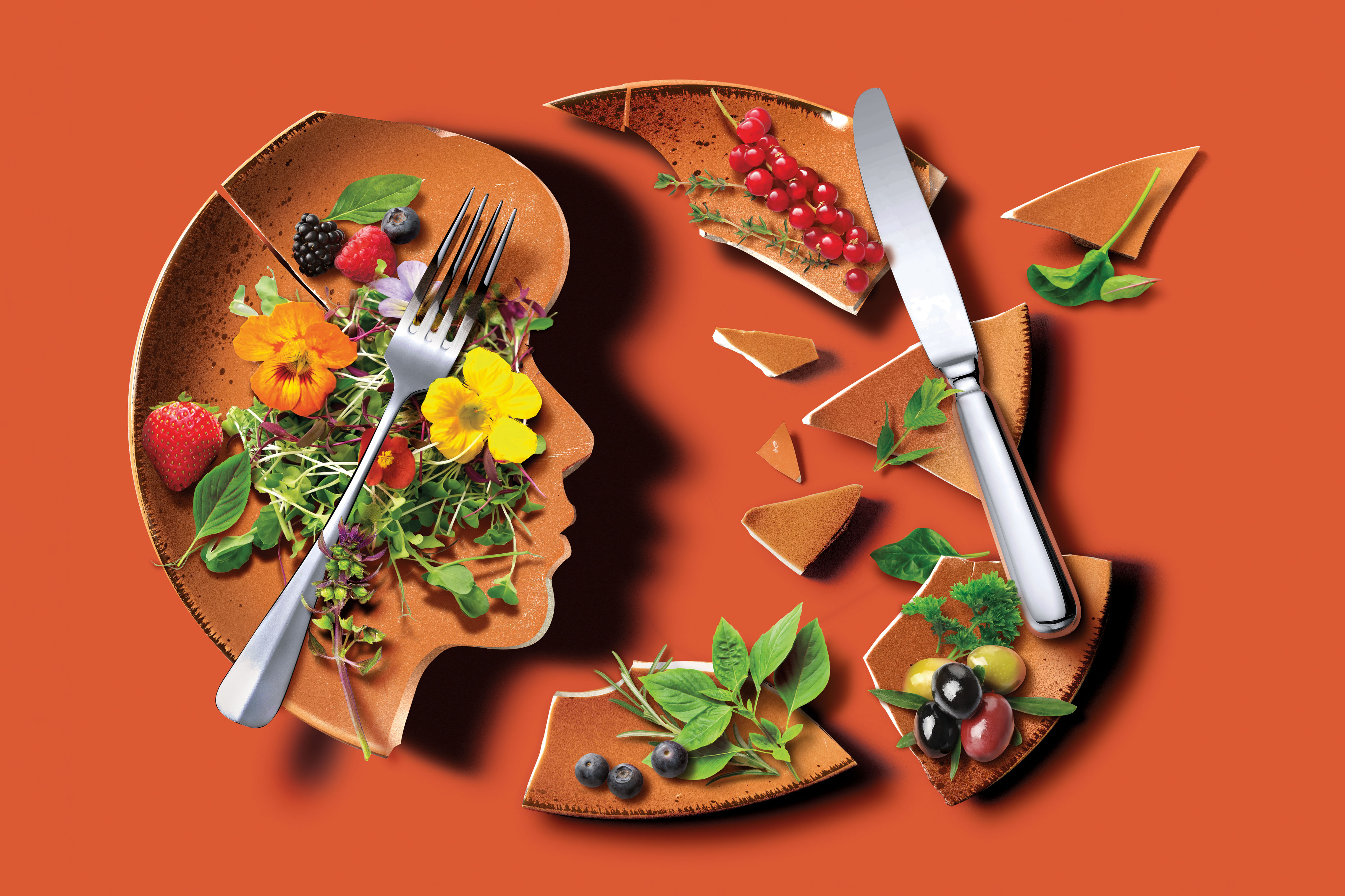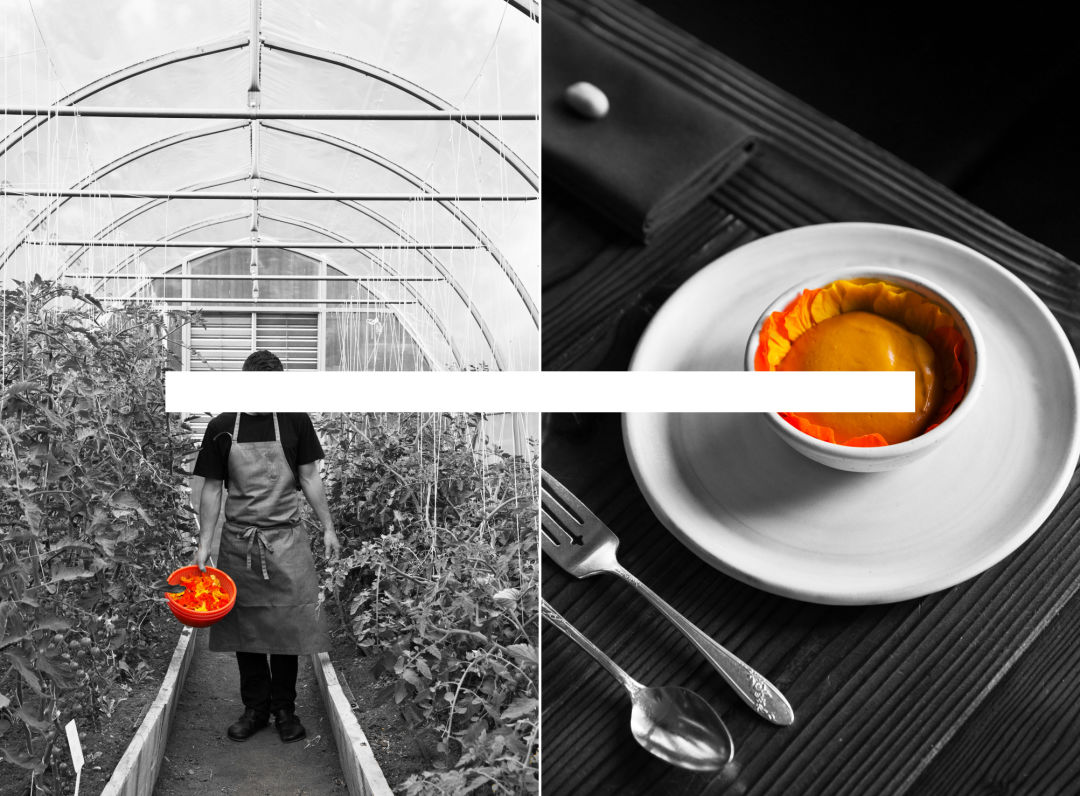
Can We Ever Go Back to Junebaby and the Willows Inn?
Editor’s Note: One month after this story published, The Seattle Times reported that Willows Inn has closed. Its owners have reportedly donated the inn and restaurant space to a local nonprofit.
Dinner at the Willows Inn began with cocktails on the veranda and the theater of blue sky and late-afternoon sun reflecting off the Rosario Strait and Salish Sea. Shortly before 7pm, the front of house staff slipped off to join their coworkers in the kitchen. Soon, pep rally sounds of feet stomping and hands drumming on countertops drifted out to the front porch.
“Did you hear us get fired up?” our server asked as he led my party into the dining room. His enthusiasm matched the Willows Instagram account, full of smiling staff members.
A flurry of one-bite creations jump-started the meal: mesquite smoked oysters in tequila sauce, then a savory version of the Mexican dessert gaznate—essentially tiny profiteroles filled with crab. A purple shiso leaf wrapped a bundle of piquant vegetables in a tiny hand roll, tied with a stem. Cooks brought courses out directly from the kitchen, as they have at Willows for years. They made proud mentions when they had worked on a particular dish themselves; I glimpsed chef Blaine Wetzel in the kitchen, but his name never entered the tableside conversation.

Image: Amber Fouts and Seattle Met Composite
The flavors were something new. Wetzel’s wife, Daniela Soto-Innes, was born in Mexico and blazed an impressive culinary career in New York before she joined Wetzel on Lummi Island. Technically she doesn’t work here, but her Mexican fine-dining influences—and members of her former staff—are everywhere.
On we went, for 13 courses. This meal had vision, it had point of view. It had the setting sun. Ferries and fishing vessels motored in the distance. This was a meal that transports you, even as it plants you firmly in this place. A year after its spectacular fall from glory, Willows Inn on Lummi Island might be the best dinner you can have in the state right now.
And we don’t talk about it. My stomach did flops of complicity as I paid the two-person bill, all $677.68 of it. For food writers like me, and the sort of dining enthusiasts who once traveled to the Northwest’s remote edge from New York or well beyond, this award-studded idyll tipped abruptly off the map in April 2021. That’s the month The New York Times dropped a story about a web of interconnected bad behavior at this restaurant 90 minutes north of Seattle, accessible only by one tiny ferry. Reporter Julia Moskin talked to 35 former staff members who painted an ugly picture of what was happening in this beautiful remove: Sexual harassment and verbal abuse in the kitchen. Staff who drank with underage girls who live on the island and considered them sexually available once they reached 16, Washington’s legal age of consent. Slurs of all kinds. A class-action lawsuit settlement over wage violations.
The damnation was culinary, too: Cooks said ingredients ordered from suppliers or supermarkets were passed off as grown, caught, or harvested on Lummi Island. One signature dish, they said, relied on chicken from Costco.
Less than two months later, our local newspaper delivered similar scrutiny of a Seattle chef.
The first time Edouardo Jordan made national headlines, he won two James Beard Awards in one night. He was writing a new lexicon on Southern food from up here in the Pacific Northwest. In June 2021, however, The Seattle Times published stories from former employees who said the chef touched and groped women in various unwanted ways.
Gross and depressing reveals like these have happened throughout the country since #MeToo. Mario Batali—one of the first celebrity chefs to be undone by women coming forward and, yes, a Seattle native—quickly separated from his business ventures and holed up out of the public eye, surfacing only for court appearances.
But somehow our state is home to two bright lights that fell fast, then got back up and kept serving dinner. Public castigation dimmed the reputations of Wetzel and Jordan, but they didn’t close their doors. Jordan’s restaurant JuneBaby reopened for dinner service nine months later. Willows—as my reluctant dinner displayed—may be serving its best food yet. Each chef owns (or is a partner in) their restaurants, so there’s no getting fired. They remain members of our dining landscape, like smiling party hosts with a few teeth knocked out.
Batali’s behavior prompted a criminal investigation and yielded lawsuits. Willows faced a class action lawsuit for handling wages improperly (an amendment prompted another, larger settlement this fall). But otherwise its revelations, and Jordan’s, have played out in the court of public opinion—a forum with no clear sentencing guidelines. They also leave conscientious diners and mainstream food media (or at least this member) grasping at how to treat restaurants that fall short of our ethical expectations, even if nobody’s adjudicating it.
Nearly two months after angry Lummi Island residents staged a protest outside the restaurant, the website Opinionated About Dining published its annual list of top restaurants in North America. Number one: Willows Inn. The dining survey’s controversial founder, Steve Plotnicki, doubled down on his support in some previous Facebook comments. After reading The New York Times story, “I value the craft that is produced at places like the Willow[s] Inn more than the transgressions bother me.”
It’s one thing to give unworthy chefs a free pass for the sake of their “art.” It’s another to wonder whether there’s a path back to grace for any chef willing to tread it.
I asked Dr. Amelia M. Wirts, an assistant professor of philosophy at the University of Washington, what that takes. Wirts specializes in social philosophy, including the law—how and when we can justify punishment. “The people doing these bad actions are so powerful and influential in their spheres, that they’re untouchable,” she says. When we stop visiting their restaurants, we undermine that power.
An apology “can be a way forward,” says Wirts. One that demonstrates “you understand the nature of the harm that you caused, and take it seriously.”
To me, the 12-step program used for addiction recovery feels like a reasonable proxy for this process. Taking moral inventory and apologizing, unequivocally and directly, to people you’ve harmed feels imperative. I’m not talking about feeble “I’m sorry to anybody who may have been offended” language.
But there’s a snarly reason we don’t see this happen very often. Taking responsibility for your actions means opening yourself up to civil, or even criminal, liability. Any good lawyer will strenuously advise a chef not to do this.
Ethically, Wirts thinks it’s totally fair to face civil liability: “You not only harmed the person of your victims, you also harmed their career path.” But if actions went beyond that, things get murky. “I’m not totally comfortable saying you should have to accept criminal responsibility in a society where our criminal justice system is really out of touch with justice.”
In other words, even when the bad deeds are unequivocal, the aftermath is incredibly complicated. Long-festering hurt is hard to overcome. One former employee who did receive a written apology from Jordan told me, “it actually fueled a lot of anger,” after she’d worked hard to be at peace. Coincidence or no, it arrived not long after JuneBaby reopened. She perceived it as a strategic move rather than something heartfelt.
The Seattle Times story on Jordan split my Twitter feed down the middle between “I had no idea!” and “Everybody’s known this for years.”
At Seattle Met, we’d sometimes quietly stop recommending or covering restaurants if we had reasonable belief that the chef or owner didn’t behave ethically. When the owner of Sushi Wataru in Ravenna was charged with assaulting and extorting one of his chefs, any mention of this place—a restaurant so good I used to celebrate my birthdays there—slipped away discreetly. (The case was settled, according to court documents.)
Jordan wasn’t so simple. A few former coworkers and employees had shared first- and second-hand accounts of comments or behavior that displayed bad judgment and even worse character. What came later in the Seattle Times story was far more damaging. But what I’d heard before that bombshell, all told to me in confidence, was more than enough to stand down on covering this chef, even when he was still a national darling.

Image: Amber Fouts and Seattle Met Composite
To borrow a restaurant term, 86’ing places where the food would otherwise merit attention was an uneasy, deeply imperfect editorial stance. You can tell your text chain “that guy is bad news; let’s go somewhere else for dinner.” That doesn’t fly in journalism, at least not without facts and verifiable info.
So I resorted to ethical slicing and dicing. Often it was just a matter of aiming our editorial spotlight in other directions—easy. But when Jordan organized a Black History Month celebration, I decided the good overrode the bad; we wrote about it. When I wrote a piece about different traditions of fried chicken, I worried that omitting one of the town’s most prominent practitioners would raise questions to which I had no official answers.
Once The Seattle Times said the quiet part loud, it mercifully dissolved the whisper network. Its investigation took a year and a half. And in its wake, all my concerns look small and stupid. I justified and tiptoed when I could have stood firm.
“Center the victims,” a former colleague repeated like an incantation, any time a writer waded into the subject of chefs and toxic behavior. He’s right, though the public still gets many more goodwill-generating glimpses of a chef’s social media comeback tour than they do reminders of the employees whose wellbeing was collateral damage. Most victims want to put their head down and move on—as is their right. As one former Willows employee who was involved in the New York Times story told me recently, “I knew a lot of people who went there and have never gone to work in another restaurant.”
I’d kinda hoped my dinner at The Willows Inn would be mediocre. That would negate any discussion of whether its efforts to rebuild made it okay to visit once again. Okay to support this place with (so many of) our dollars. I was also curious—who still goes here? My casual conversations with the two-tops on either side of my table indicated they had no idea the most prominent newspaper in the country had ever published ruinous accounts of the kitchen culture.
Today, the Willows website includes a sourcing guide for its ingredients. A few months after the article, the restaurant’s email newsletter shared details of a new HR manager and more diversity in management. The smokehouse out by the parking lot now has a neon sign over the door that says “Good Vibes” in swirly pink text.
Apparently, enough unaware (or sympathetic) diners come through the doors to keep these restaurants open. Since these two investigations, I’ve started asking cooks and chefs I trust if they’ve heard anything unsavory about folks I cover regularly. Making those overtures feels bumpy and juvenile, like I’m fishing for gossip or formulating a vendetta. I have a Post-it on my computer monitor to remind me that court record searches are quick and easy, if usually fruitless.
I know these measures are clumsy. Our most effective tools against bad actors—lengthy lawsuits and painstaking investigative journalism—are slow and laborious. And I realize perpetrators aren’t two-dimensional villains. Their behavior usually stems from what they saw coming up in other kitchens. I want to live in a world where their redemption is possible, but I haven’t seen any actions yet that come close.
Suddenly pretending these places don’t exist doesn’t seem like such a bad idea after all. There are too many other worthy, talented cooks busting their ass out there. My dinner at Willows was stunning, but it’s still off the map for me. Same with JuneBaby. Maybe that isn’t fair. Neither are the situations that brought us here.



